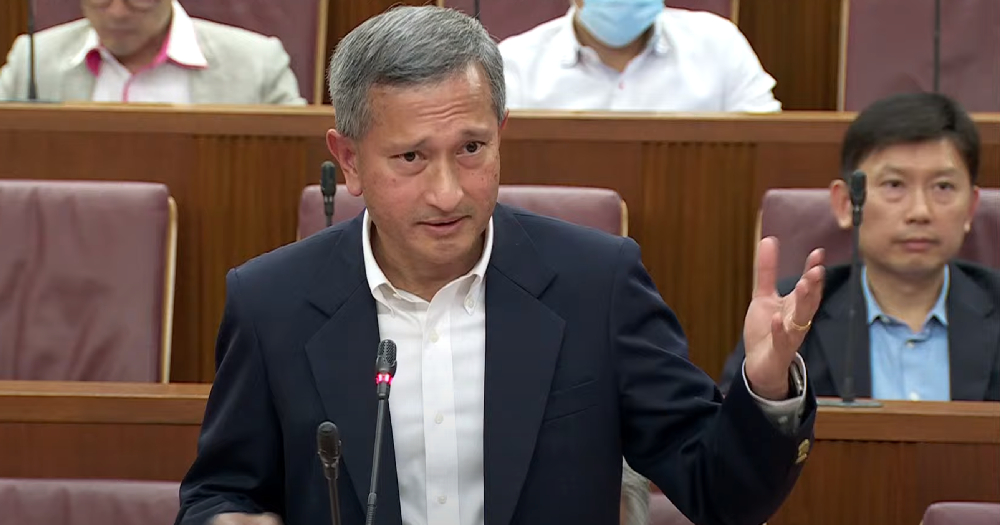Follow us on Telegram for the latest updates: https://t.me/mothershipsg
Minister for Foreign Affairs Vivian Balakrishnan spoke in parliament about the repeal of Section 377A and his stance on the constitutional amendment to protect parliament's right to decide on the status of marriage.
Three propositions
Vivian started by laying out three propositions on which he based his decision making process.
First was that traditional marriage, by which he meant marriage between one man and one woman, has been venerated since "time immemorial", across all societies and civilisations.
Second, a marriage was more than a legally binding contract between two consenting adults.
And finally, the rights of children was paramount, even over that of happiness of their parents.
Vivian said that every Member of Parliament (MP) who was a parent knew that "love flows down the generations" in what was mainly a one way fashion. When he first held his own daughter, he realised then that he could not love his parents as much as he loved his daughter, and in time she would feel the same.
This therefore drives parents to focus on leaving the world in a better state for their children to inherit.
Experience in previous ministerial role
Vivian then recounted his time as Minister for Community Development, Youth and Sports, the predecessor to the Ministry of Social and Family Development.
He spoke about how mothers and fathers played essential, complementary, but not identical roles. In his time at the ministry, he observed that the most common recurring issue children in juvenile homes or in dysfunctional social circumstances faced was an absent father.
For this reason, he was unapologetically in favour of the traditional family form as an ideal, one man and one woman, committed to each other in a stable marriage, bringing up their children.
But he acknowledged that not everyone will be "so blessed and enjoy such a simple, straightforward life." Sometimes life didn't go to plan, but all children regardless of family circumstances deserved and needed additional support.
Vivian on the pain and fear experienced by his gay friends
He then spoke about his friends who were gay and how, coming of age in the 1980s, Vivian's gay friends had to face a then little-known unnamed AIDS epidemic.
"The veil of ignorance, the fear of embarrassment in fact, contributed tragically to the cutting short of lives of some of my friends. But beyond that, in fact, I'm sure if you all speak to every single one of your gay friends. Every single one of them has suffered the pain of rejection, discrimination, all kinds of violence. And they have suffered that at home, in schools and in the work place."
They all sought understanding, empathy, support, and protection, but he said that many, including himself, had fallen short. Vivian confessed he was one of them and apologised to his gay friends.
Vivian then laid out the debate over 377A as having come to symbolise the two paradoxical imperatives: the protection of the traditional family, and the equally important duty to protect gay people from victimisation, fear, pain, dejection, and rejection.
Trust the kids
Vivian, as part of the Holland-Bukit Timah GRC team had met, online and face to face, many residents. The majority expressed anxiety about repeal of 377A, and the future of families.
Some of the residents he spoke to wanted traditional marriage to be entrenched in the constitution, essentially "locked up". But Vivian said that that there were some issues no number of legal lock ups would solve.
Allowing the courts to rule on 377A and potentially strike it down might cause unpredictable and perhaps uncontrollable social and political consequences, Vivian said.
For that reason he supported the repeal of section 377A, but also the constitutional amendment that ensured that it was Parliament, not the Courts, who decided on the status of marriage.
Spirit of mutual respect
Ultimately, it was important to trust the future generations to make these decisions for themselves. At some point in the future, another parliament with different MPs, would have to decide. And it would be decided through the political process with discussion, debate, negotiations and compromises.
He said it was important to protect the institution of marriage and the welfare of children, which in practice meant policies that support traditional families, in his view. But uplifting one type of social arrangements inevitably means one had to choose, and it "cannot be completely equal".
However it was important to to have a "spirit of mutual respect" and, perhaps more importantly, compassion.
Only in this way was it possible to find a "safe landing zone" where Singapore could protect both its families and its gay community.
Related stories
Top image by MCI Singapore/YouTube
If you like what you read, follow us on Facebook, Instagram, Twitter and Telegram to get the latest updates.
